|
De Duitse schrijfster Maren Winter werd geboren op 20 augustus 1961 in Lübeck. Zie ook alle tags voor Maren Winter op dit blog.
Uit: Das Erbe des Puppenspielers
„Ihre Glieder waren von oben bis unten mit angetrocknetem Lehm bekleckst, man konnte die ursprüngliche Farbe ihrer Kleider nicht mehr erkennen, und aus der verfilzten Zottelmähne bröselte Staub. Das Gesicht war streifig verschmiert, aber ihre Augen glänzten wie polierte Kastanien. Ich stammelte etwas von "Küchenjunge", und sie brach in Gelächter aus.
"Du Mickerling willst Küchenjunge sein?", gluckste sie. "Ich heiße Gisela, und ich zeige dir lieber den Weg, sonst kommst du noch vor dem Essen unter die Hufe."
Schon rannte sie los, und ich hastete hinter ihr her zu einem steinernen Nebengebäude. "Warte nur, in ein paar Wochen bist du fett wie Bertha." Sie öffnete die Tür und schubste mich hinein.
Es duftete warm nach Suppe. Ein langer Tisch bestimmte das riesige Gewölbe. Hier wurden Fische geschuppt und Berge von Gemüse geschnitten.
An der Stirnseite stand der Koch, brummte Anweisungen und walkte kräftig den Teig. Seine Oberarme waberten dabei wie kalte Grütze. Ich überlegte, ob ich wohl zu ihm gehen und mich vorstellen musste. Doch da rollte aus dem dunstgeschwängerten Teil des Raumes eine Magd heran, ein mächtiges Weib, in dessen Busen man gewiss ersticken konnte. Das musste Bertha sein. Sie entdeckte mich und schob sich um den Tisch. "Wer ist das?"
"Mein Name ist Meginhard, der Meier hat gesagt, ich soll ... "
"He, Eigil!", rief sie gellend. "Du bekommst Unterstützung. Der Bastard hier will dir das Wasser tragen."
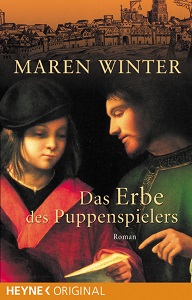
Maren Winter (Lübeck, 20 augustus 1961)
Cover
De Belgische schrijver Charles de Coster werd geboren in München op 20 augustus 1827. Zie ook alle tags voor Charles de Coster op dit blog.
Uit: De legende en de heldhaftige, vroolijke en roemrijke daden van Uilenspiegel en Lamme Goedzak in Vlaanderenland en elders
“Dien dag besloot Zijne Heilige Majesteit keizer Karel, groote feesten te geven om de geboorte van zijn zoon te vieren. Evenals Klaas, besloot hij te gaan visschen, niet in de vaart, doch in de beurzen en tasschen zijner onderdanen. Daaruit is het dat vorstelijke lijnen karolussen, zilveren daalders, gouden leeuwen en al die wonderbare visschen trekken die, naar willekeur van den visscher, veranderen in fluweelen kleederen en schitterende edelgesteenten, in lekkeren wijn en smakelijke gerechten. Want de rivieren die 't rijkst zijn aan visch, zijn die niet waar het meeste water is.
Nadat Zijne Heilige Majesteit die van zijn raad bijeengeroepen had, besloot hij dat de vangst volgenderwijze geschieden zou:
De genadige infant zou rond negen of tien uren ten doop gebracht worden; ten blijke van hunne groote vreugde, zouden de inwoners van Valladolid heel den nacht, op eigen kosten, feesten en kermissen. Verder zouden zij, ten bate der armen, hun geld op de Groote Markt strooien.
Op vijf plaatsen van de stad zou eene fontein, tot den dageraad, goeden wijn spruiten, die door de stad moest betaald worden. Op vijf andere plaatsen zouden, op houten kramen, allerhande worsten, ossetongen en andere vleeschspijzen staan, mede ten laste van de stad.
Mede op eigen kosten zouden die van Valladolid op den doortocht van den stoet, in grooten getale, zegebogen oprichten, verbeeldende den Vrede, het Geluk, den Overvloed, de Fortuin en allerhande zinnebeeldige toespelingen op de gaven des hemels, waarmede zij onder de regeering van Zijne Heilige Majesteit begunstigd waren.
Ten slotte en behalve deze teekens van pais, zouden er andere opgericht worden, waarop, in helle kleuren, minder goedertieren kenteekenen zouden prijken, zooals leeuwen, arenden, lansen, hellebaarden, vlammende spiesen, kanonnen, falkonetten, slangen met wijden mond, mitsgaders al ander oorlogsgetuig, om op zinnebeeldige wijze de macht en de kracht van Zijne Heilige Majesteit voor te stellen.”
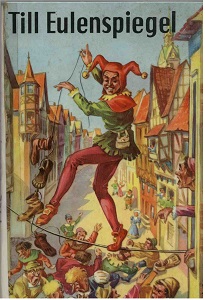
Charles de Coster (20 augustus 1827 - 7 mei 1879)
Cover
De Engelse dichter Edgar Albert Guest werd geboren op 20 augustus 1881 in Birmingham, Engeland. Zie ook alle tags voor Edgar Guest op dit blog.
The Temple - What Makes It Of Worth
You may delve down to rock for your foundation piers,
You may go with your steel to the sky
You may purchase the best of the thought of the years,
And the finest of workmanship buy.
You may line with the rarest of marble each hall,
And with gold you may tint it; but then
It is only a building if it, after all,
Isn't filled with the spirit of men.
You may put up a structure of brick and of stone,
Such as never was put up before;
Place there the costliest woods that are grown,
And carve every pillar and door.
You may fill it with splendors of quarry and mine,
With the glories of brush and of pen —
But it's only a building, though ever so fine,
If it hasn't the spirit of men.
You may build such structure that lightning can't harm,
Or one that an earthquake can't raze;
You may build it of granite, and boast that its charm
Shall last to the end of all days.
But you might as well never have builded at all,
Never cleared off the bog and the fen,
If, after it's finished, its sheltering wall
Doesn't stand for the spirit of men.
For it isn't the marble, nor is it the stone
Nor is it the columns of steel,
By which is the worth of an edifice known;
But it's something that's living and real.
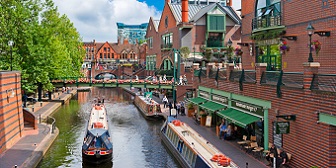
Edgar Guest (20 augustus 1881 – 5 augustus 1959)
Birmingham, canal
De Noorse dichter en schrijver Tarjei Vesaas werd geboren in in Vinje, Telemark op 20 augustus 1897. Zie ook alle tags voor Tarjei Vesaas op dit blog.
Uit: The Bridges (Vertaald door Elizabeth Rokkan)
“The wind filtering from the distance; and the old stone bridge over the river where the high road goes. The dark parapet of the bridge, its stones fretted over time by rain, sun and wind, tall and dominating in the landscape. The mountainside in the one direction does not detract from the bridge and its impressive appearance — daringly built, with wide arches.
A current that looks like still water.
A river that is too deep and powerful for its movements to be visible on this flat valley floor. No rippling of the current against the stones. Great masses of water glide away day and night, and no one thinks about it unless reminded of it. Gliding depths moving past without pause.
Out on the bridge the young boy Torvil came to a halt, stopped by some thought. It was a day in late summer. Idle holiday-time. Torvil looked absently down into the water. He was eighteen years old, lived beside this bridge, and had seen the bridge and the river for as long as he could remember.
Torvil stood thinking about his girl, his friend Aud.
Aud, too, he had seen every day for as long as he could remember, because she lived in the house next to his, and because she was the same age as himself. She had always been his playfellow. And she had been his only real friend.
Now they were eighteen years old.
They knew very well what their parents at home in the two houses were hoping for and counting on — and this alone acted as a brake on things that might otherwise have happened naturally. They felt they wanted to defy them. But they knew too that they liked one another, and had no need of any other company. Now and again they touched each other, but let go at once — because four wiseacres were sitting at home wanting this to happen. With a tingling in his body he thought about what would happen in the end all the same.
Torvil stood on the bridge and set a star on Aud. A star without a name."
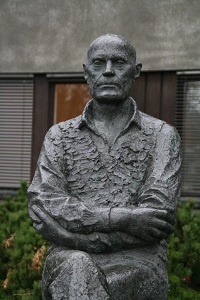
Tarjei Vesaas (20 augustus 1897 – 15 maart 1970)
Standbeeld in Vinje
De Italiaanse dichter en criticus Salvatore Quasimodo werd geboren op 20 augustus 1901 in Modica op Sicilië. Zie ook alle tags voor Salvatore Quasimodo op dit blog.
Refuge of Nocturnal Birds
On the heights a twisted pine;
intent, listening to the void
with trunk arched in a bow?
Refuge of nocturnal birds,
it resounds at the ultimate hour,
with a beating of swift wings.
It even has its nest my heart
suspended in the darkness, a voice;
also listening, the night
The Sea Still Sounds
Even more so at night the sea still sounds,
Lightly, up and down, along the smooth sands.
Echo of an enclosed voice in the mind,
that returns in time; and also that
assiduous lament of the gulls; birds
perhaps of the summits that April
drives towards the plain; already
you are near to me in that voice;
and I wish there might yet come to you
from me, an echo of memory,
like this dark murmur of the sea.
Vertaald door A. S. Kline
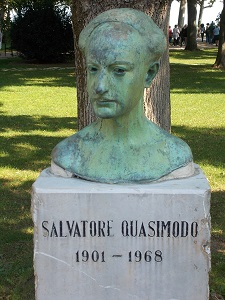
Salvatore Quasimodo (20 augustus 1901 - 14 juni 1968)
Borstbeeld door Francesco Messina in Balatonfüred, Hongarije
De Engelse schrijver en journalist Colin MacInnes werd geboren op 20 augustus 1914 in Londen. Zie ook alle tags voor Colin MacInnes op dit blog.
Uit:City of Spades
“He emitted a thin smile. ‘In that case, may I say I think you’re going to have quite a lot of fun?’
‘I sincerely hope so … I have certain vague impressions about Negroes, of course. I rather admire their sleek, loose-limbed appearance …’
‘Yes, yes. So very engaging.’
‘And their elegant, flamboyant style of dress is not without its charm …’
‘Ah, that far, personally, I cannot follow you.’
‘On the other hand, for their dismal spirituals and their idiotic calypso, I have the most marked distaste.’
‘I’m with you there, Pew, I’m glad to say. The European passion for these sad and silly songs has always baffled me. Though their jazz, in so far as it is theirs, is perhaps another matter.’
He had risen once again. I saw he had made up his mind I was beyond hope.
‘And what do I do with our coloured cousins?’ I asked him, rising too.
‘Yours is a wide assignment, limitless almost as the sea. You must be their unpaid lawyer, estate agent, wet-nurse and, in a word, their bloody guardian angel.’
The note of disdain, even though coming from a professional civil servant to an amateur, had become increasingly displeasing to me. I said with dignity: ‘Nothing, I suppose, could be more delightful and meritorious.’
He had now closed his eyes; and stood, at the door, a Whitehall Machiavelli.
‘Some might say,’ he told me softly, ‘that your duty is to help them to corrupt our country.’
Up went my brows.
‘So some might say … their irruption among us has not been an unmixed blessing. Thousands, you see, have come here in the last few years from Africa and the Caribbean, and given us what we never had before – a colour problem.’
His eyes opened slowly in a slit. ‘Could it not be,’ I said, ‘that we have given them just that in their own countries?’
‘My dear Pew! Could it be that I positively find myself in the presence of a liberal?’
‘My dear boy, of course you do! What else can one comfortably be in these monolithic days?’
He smiled with every tooth.”
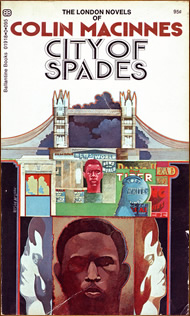
Colin MacInnes (20 augustus 1914 - 22 april 1976)
Zie voor nog meer schrijvers van de 20e augustus ook mijn vorige blog van vandaag.
|



